Active Citizenship in the Digital Age
30 Νοvember-2 December 2023
The Department of American Literature and Culture of the School of English, Aristotle University of Thessaloniki, Greece, is organizing an International Symposium with the title “Active Citizenship in the Digital Age.” The symposium is the outcome of postdoctoral research that has been in progress in the School of English and examines active citizenship for learners in the digital age in the context of diverse cultural manifestations (poetry, film, theatre, art, journalism, environmentalism) and social media interventions.
It seeks to bring together interdisciplinary and converging investigations on digital mediations while engaging academics, activists, artists, educators and students in a dialogue about the most pressing concerns relating to the power and the gains as well as the risks of involving young learners and future citizens in shaping present rich media ecosystems.
Dates: 30 Νοvember-2 December 2023
Format: Hybrid (Online and Onsite)
Onsite Venues:
- Workshops on Nov. 30, 2023 (Room 308B, School of English, Faculty of Philosopy, AUTh)
- Presentations & Workshop on Dec. 1, 2023 (Amph. III, KEDEA, Red Building, AUTh Research Dissemination Center)
Online Venue:
- Presentations on Dec. 2, 2023 (ZOOM)
Speakers & Abstracts
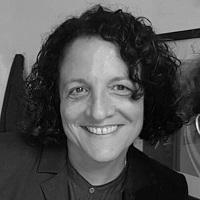
TINA BASTAJIAN is a media artist, researcher, and essayist born in Los Angeles, who lives and works in Amsterdam. She holds an MA in Preservation and Presentation of the Moving Image from the University of Amsterdam. Her work in both theory and practice uses experimental approaches to narrative and documentary forms to explore themes of memory and the diasporic; the counter archive, the fragment, erasure, ephemerality, and the contours of voice and translation. Bastajian’s work has been shown internationally at festivals, galleries, museums, and symposia, and she has published widely. As a lecturer and tutor she collaborates with AUC/Amsterdam University College, Sandberg Institute Design department, and the BA program, Moving Image at ArtEZ Institute of the Arts – AKI Academy of Art & Design.
Active citizenship and VR cinema
presenting with Maria Poulaki
In this presentation we will discuss the possibilities of being ‘active’ in the context of a medium that has traditionally presupposed a relatively passive and suggestible to dominant ideology spectator. Drawing on psychology as well as film and media theory, we will focus on Virtual Reality’s merging with cinema and discuss how such new VR/ cinematic experiences and forms of dramaturgy can afford (or not) active citizenship, alongside immersion and empathy.

KONSTANTINOS BLATANIS is Assistant Professor of American Literature and Culture at the Faculty of English Language and Literature, University of Athens. He is the author of the book Popular Culture Icons in Contemporary American Drama (Fairleigh Dickinson University Press, 2003) and co-editor of the volume War on the Human: New Responses to an Ever-Present Debate (Cambridge Scholars Publishing, 2017). Some of his recent articles include, “The Significance of the Sea in Eugene O’Neill’s Early Work: The Formation of a Chronicle of Change” American Studies Over-Seas (Peter Lang, 2022) and “Broadway Rap Battles and the Crisis of Historicity: Lin-Manuel Miranda’s Hamilton,” Critical Stages / Scènes critiques 21 (2020). His research interests lie in American literature, modern drama, popular culture, media studies, and critical theory.
Active Citizenship and Historical Awareness in Twenty-first Century American Drama and Theater: José Rivera’s Brainpeople and Naomi Wallace’s The Fever Chart: Three Visions of the Middle East
The aim of this paper is to explore the original ways in which individual instances of twenty-first century American drama and theater assess active citizenship and historical awareness as two notions and values that need to be interconnected within the context of today’s highly globalized world. The discussion recognizes as its starting point the task that the contemporary American stage undertakes whenever it attempts to tackle courageously any of the manifold manifestations of the interrelated geopolitical, economic and ecological crises that define the current, “digital” age. Attention is thus devoted to the challenges that drama and theater face in the historical present, characterized by the exponential development of neoliberalism on global scale, the widespread resurgence of populism and fascism, the phenomenon that Giorgio Agamben outlines as the “de-politicization of citizenship,” and, last but not least, ecological disaster. It is against this climate that Rivera’s Brainpeople and Wallace’s The Fever Chart — two entirely different, yet related plays of the late 2000s — position themselves and contend in practical terms that active citizenship and historical awareness can only be seen as two concepts that inform one another. These two works which experiment with the dynamics of the stage, reaffirming the versatility and flexibility of drama and theater as cultural forms, are read here parallel to each other and thus the discussion bridges a vast and expansive distance. While, in the first play action is set in a dystopic Los Angeles of the near future and the second one revisits Palestine and Iraq of the late twentieth and early twenty-first centuries, the paper argues that both cases emphasize the value that building organic connections with history carries for the very conceptualization and initiation of genuine active citizenship in today’s world.
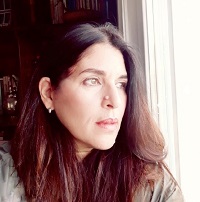
SOPHIA EMMANOUILIDOU received her Ph.D. from the School of English at Aristotle University of Thessaloniki, Greece, with distinctions in 2003, and on a full scholarship from the Foundation of National Scholarships in Greece (IKY). She was a Fulbright grantee at the University of Texas, Austin, and the John F. Kennedy Institute (JFKI) for North American Studies, Freie Universität of Berlin. She has published several articles on Chicana/o literature and identity-focused theories. Her interests include border cultures, social studies, ecocriticism and ecofeminism. She is the co-editor of the volume Transnational Interconnections of Nature Studies and the Environmental Humanities (2020), Ex-centric Narratives: Journal of Anglophone Literature, Culture and Media, vol. 3 (2019 )and the Special Issue of Revista Canaria de Estudios Ingleses,vol. 81(2020). Her latest project is editing the Greek translation of Tino Villanueva’s So Spoke Penelope (Vakhikon Publications 2022). As of May 2022, she serves as the Program Coordinator for The Society for Multi-Ethnic Studies: Europe and the Americas (MESEA) (see: https://mesea.org/). She is presently affiliated with, Aristotle University of Thessaloniki, Department of American Literature and Culture.
Interrogations in Human Exceptionalism: Literary and Digital Readings in/for Natureculture
Donna Haraway’s conceptual tool of natureculture speaks for the inseparability in ecological and social relationships, and prompts us to consider the synergies between nature and culture. In the context of questioning dualisms (human/nonhuman, mental/physical, dominant/subordinate life forms, and more), natureculture encourages contemporary (Western) societies to reconsider the ‘intelligibility and legitimacy’ of human exceptionalism, to revise our reliance on intellectual achievements, and, ultimately, to graft the Humanities with the natural sciences. This lecture attempts a decentralization of human-centered perspectives and/or conventions, and (re)reads life on planet Earth in biocentric or post-humanist terms. The intention is to explore how selected literary writings and digital/ized representations of nature unveil a potent ecological agency and increase humanity’s awareness of the non-cultural, physical cosmos. The works to be discussed promote a new culture of volitional interdependence in the age of the Anthropocene, whereby contemporary prerogatives and directionalities can meaningfully converse with some of the communalities of the Other: the natural world surrounding and hosting us.
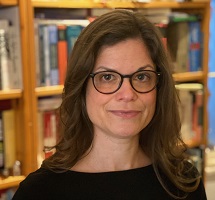
INGRID GESSNER is Professor for English and American Studies at the University College of Education Vorarlberg in Feldkirch, Austria. She has been a Visiting Professor of American Studies at the University of Erlangen-Nuremberg, Germany. Her studies have also led her to the University of California, Davis, and the University of Michigan, Ann Arbor. Her book Yellow Fever Years: An Epidemiology of Nineteenth-Century Literature and Culture (2016) has been awarded the Peter Lang Young Scholars Award. She is the author of Collective Memory as Catharsis? The Vietnam Veterans Memorial in Public Controversy (2000) and of the award-winning From Sites of Memory to Cybersights: (Re)Framing Japanese American Experiences (2007). Further publications include articles on feminism and gender studies, on questions of transnationalism, and on teaching American Studies. In the field of the digital humanities, she has published “Notes on the State of Digital American Studies Scholarship, Publishing, and Teaching” (2019), edited a special issue on “Digital Pedagogy in American Studies” (2020), and curated a special forum on “Digitization, Digital Humanities, and American Studies” (2023). In 2015, she published “The Aesthetics of Remembering 9/11: Toward a Transnational Typology of Memorials” in the Journal of Transnational American Studies. This article served as the basis for a DH project, which includes a searchable geolocative database showcasing 9/11 memorials worldwide. The year 2019 saw her appointment to the editorial boards of Amerikastudien / American Studies and the Journal of the Austrian Association for American Studies (JAAAS). As an elected member of the EAAS Women’s network steering committee (2014-22) and co-founder of the network’s open access journal WiN, she has organized four of the network’s biannual conferences. Since 2022 she is Secretary General of the European Association for American Studies and Vice President of the Austrian Association for American Studies.
Augmenting Environmental Activism: Exploring the Intersections of Digital Practice and Civic Engagement”
This presentation explores the current role of digital practices in environmental justice activism. Specifically, it investigates how augmented reality (AR) art installations and interventions can serve as powerful tools for promoting awareness and inspiring action towards pressing environmental issues. Drawing on a range of case studies, including “Water wARs” (2011) by John Craig Freeman, “Enter the Plastoscene” (2021), “Forest Flux” (2023) and “Gardens of the Anthropocene” (2016) by Tamiko Thiel, “After Ice” (2017) by Justin Brice Guariglia, “Arcadia Earth” (2022) by Valentino Vettori, and “Endangered Animals in 3D” (2021) by the Swedish Society for Nature Conservation, this presentation analyzes the ways in which AR can provide immersive and interactive experiences that engage audiences in critical reflection and action.
Moreover, this presentation explores the potential of AR in American Studies and digital pedagogy, as a medium that relies on and fosters interdisciplinary conversations and promotes transnational collaborations. Through this analysis, the significance of digital practices as part of environmental activism is highlighted, and an argument is made for AR interventions as innovative and transformative tools for promoting social and environmental justice.
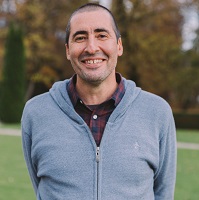
PAUL MIHAILIDIS is a professor of civic media and journalism and assistant dean in the school of communication at Emerson College in Boston, MA. He is founding program director of the MA in Media Design, Senior Fellow of the Emerson Engagement Lab, and faculty chair and director of the Salzburg Academy on Media and Global Change. Dr. Mihailidis has published 8 books and over 80 articles and book chapters on the intersection of media literacy, civic media and engagement in digital culture. His work has been featured in the New York Times, the Washington Post, Scientific American, Slate Magazine, the Nieman Foundation, USA Today, NBC, Newsweek, and CNN. Mihailidis has won multiple faculty awards at Emerson College and the Researcher of the Year award by the National Association of Media Literacy Education in 2016. He holds a visiting professorship at Bournemouth University in England, and serves on the advisory board for NAMLE and iCivics. Mihailidis holds a Ph.D. from the Philip Merrill College of Journalism at the University of Maryland, College Park, an MPhil from Stirling University, and a BA from the University of Massachusetts, Amherst.
Persistent Engagement in a Digital Culture of Transaction: Civic Media, Proximal Belonging, and the future of civic agency
Today, our immersive technological environments have reshaped our relationship to our communities. Large, connective media platforms have provided efficient and convenient avenues for information and communication. These platforms, through their design, prioritize transaction, sensationalized continued, and shallow engagement. Over time, they have inserted distance between people, their proximal environments, and the civic institutions that they rely on. The result has been less engagement with our local civic processes, increased divisions between communities, and overall declining civic health. And while these platforms have helped with certain aspects of civic life, their presence has prompted a reevaluation of what meaningful participation in civic life should be, and what balance between mediated and proximal engagement is right for robust civic participation in digital culture.
This talk will explore the concept of civic distance to highlight some of the problems with civic participation in a post-pandemic digital culture. It will use this framing to talk about meaningful pathways forward from proximal engagement that uses community, creativity and care to restore civic health and active engagement in democratic life for young people today.
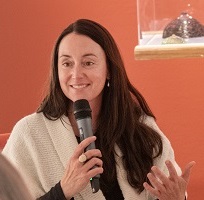
RACHEL MOORE currently lives and works in Stowe, Vermont as an interdisciplinary artist, organizer, curator, and the director of The Current, a center for contemporary art. She believes in art as a catalyst for change, and therefore in her studio and curatorial practices she brings to light environmental or social injustice through research, narrative, and socially engaged work that serves to create the necessary action to provoke change. Moore is a co-founder of Spoke, an exhibition and event space in Chicago (2008-2011), and was a Fulbright Fellow in Greece (2009-2010). She has received numerous grants for both curatorial and studio practices such as Seattle Art Museum (PONCHO Award), Vermont Arts Council, the National Endowment for the Arts, The Andy Warhol Foundation for the Visual Arts; has been an artist-in-residence twice at both Vermont Studio Center and Pilchuck Glass School; and has curated or exhibited in numerous museums and galleries, including the Macedonian Museum of Contemporary Art in Thessaloniki, Greece; The Garfield Park Conservatory, Chicago, IL; DYNAMO Project Space, Thessaloniki, Greece; Figge Art Museum in Iowa; Muskegon Museum in Michigan; Bellevue Arts Museum in Washington; Grand Rapids Art Museum in Michigan; BWA Wrocław Galleries of Contemporary Art, Wrocław, Poland.
Art, Activism, + Digital Culture
Throughout history, art has been synonymous with storytelling and activism. It has the power to transcend language and connect people with disparate ideologies in a somatic, visceral, and intellectual manner. This presentation explores several artistic and curatorial projects within the categories of social practice, public art, and individual studio practice in order to give examples of art as a catalyst for change. By working with students and engaging communities, these projects show how art can harness more energy in order to create more engagement and impact. From community mural projects to oral history collection, art is change in social justice movements. Through public street art, it is hope in a war-torn country. And art as conversation is connection and understanding over great political or religious divide. The resulting use of education and digital media as tools of engagement in art and activism today, showcases the relevance, immediacy, and impact of the role of art and why it is essential to our lives.
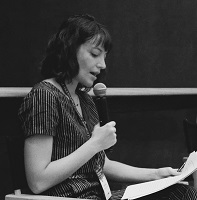
MARIA POULAKI is assistant professor in Cinema and American culture at Aristotle University. With an interdisciplinary background in psychology, media and culture, she has been teaching courses in film and media studies since 2011 in the Netherlands and the UK. Her work has appeared in various journals and edited volumes, and she has coedited the books Compact Cinematics: The Moving Image in the Age of Bit-Sized Media (Bloomsbury 2017), and Narrative Complexity: Cognition, Embodiment, Evolution (University of Nebraska Press 2019).
Active citizenship and VR cinema
presenting with Tina Bastajian
In this presentation we will discuss the possibilities of being ‘active’ in the context of a medium that has traditionally presupposed a relatively passive and suggestible to dominant ideology spectator. Drawing on psychology as well as film and media theory, we will focus on Virtual Reality’s merging with cinema and discuss how such new VR/ cinematic experiences and forms of dramaturgy can afford (or not) active citizenship, alongside immersion and empathy.
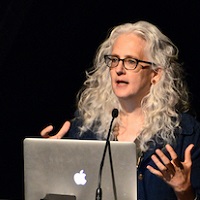
Governor General’s Literary Award winner, KATE PULLINGER, writes for both print and digital platforms. Her new novel, Forest Green, a story about a logger who works in the forests of British Columbia, came out in 2021 and is now available in paperback. In May 2021 Pullinger won the Marjorie C. Luesebrink Career Achievement Award, given every year by the Electronic Literature Organisation. Her most recent digital fiction, Breathe, a ghost story that knows where you are, is available for free on your phone. It was shortlisted for the New Media Writing Prize in 2019. In 2009 Pullinger’s novel The Mistress of Nothing won the Governor General’s Literary Award for Fiction, one of Canada’s most prestigious literary prizes. It was also longlisted for the Giller Prize. Her prize-winning digital fiction projects, including Inanimate Alice, have reached audiences around the world. In 2014 Pullinger was awarded the Anne Green Award for Innovation at Wordfest, Canada. Kate is Professor of Creative Writing and Digital Media at Bath Spa University where she is also Co-Director of the Centre for Research in the Cultural and Creative Industries.
From Print to Digital: from Digital to Print
Kate Pullinger is a novelist who has also worked with hybrid digital forms over the past two decades. In this talk she will use examples from her own practice to show how content and form are interdependent; how digital media offers new opportunities for storytelling; how narrative can be transformed and augmented by reader participation. From her Governor General Award-winning novel, The Mistress of Nothing, to her collaboration with Google Creative Labs, Breathe, and her prize-winning interactive children’s title, Inanimate Alice, and the participatory media project, Letter to an Unknown Soldier, Pullinger will discuss the tensions and contradictions of working across both print media – books – and digitally-mediated forms of storytelling.
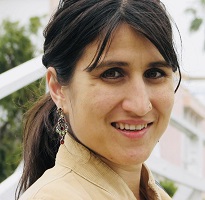
SANGITA SHRESTHOVA PhD is a scholar, practitioner, educator, artist, and writer. Sangita focuses on connected learning, cross-cultural parenting, popular culture, performance, new media, and civics. She is an author of three recent co-authored books: Popular Culture and the Civic Imagination: Case Studies of Creative Change (2020), Practicing Futures: A Civic Imagination Action Handbook (2020) and Transformative Media Pedagogies (2021). Her creative work has been presented at the Schaubuehne (Berlin), Other Festival (Chennai), EBS International Documentary Festival (Seoul), and the American Dance Festival (Durham, NC). She is currently the Director of Programs and Research and Co-PI of Civic Paths Group at the University of Southern California.
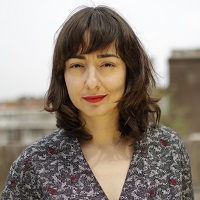
DANAE THEODORIDOU is a performance maker and researcher. Her artistic research focuses on social imaginaries, the practice of democracy and the way that art contributes to the emergence of socio-political alternatives. She teaches in Fontys University of Applied Sciences (NL) and in Aristotle University of Thessaloniki (GR), curates practice-led research projects, and presents and publishes her work internationally. She is the co-author of The Practice of Dramaturgy: Working on Actions in Performance (Valiz, 2017) and the author of PUBLICING: Practising Democracy Through Performance (Nissos, 2022). Website.
Embodied Approaches to Democracy in the Digital Sphere
The panel draws on my four yearlong artistic research on the Practice of Democracy and on ideas expressed in my recent publication Public_ing – Practising Democracy Through Performance (Nissos 2022). Main topic of interest here is the relation between the performing arts and politics, with an emphasis on the embodied, affective dimension of democracy, and the way such dimension can be practiced through the (disembodied) digital sphere. More specifically, the panel will present and discuss the online participatory project Languages of the Unheard (2020), which focused on an insightful exploration of the language of protests and was cocreated by a group of women from different European countries, some of whom are also part of the panel.
Political scholars argue that today we live in demo-cracies without a demos, where citizens are alarmingly absent from elections and political decision-making. How could art contribute to overcoming this crisis? ‘The people’, Chantal Mouffe notes, cannot exist in an abstract sense, before its public appearance. In order for ‘demos’ to exists, its members have to meet and exchange views on the here and now. Demos then exists only when recognizing and practicing the embodied emotional dimension of politics. How can the performing arts provide a frame for such practice? Even more specifically, how can art work with the embodied performativity of democracy in the immaterial digital sphere? What are the artistic tools that could contribute to the reemergence of demos and the empowerment of citizens of all ages in this case? These are some of the questions that this participatory panel will attempt to address through the diverse voices of its participants.

NIKOS AMANATIDIS is an Educational Consultant at the Directorate of Education of Eastern Thessaloniki, former Educational Coordinator in Alexandria, Imathia at the 3rd PEKES based in Veroia, and former director and teacher at the 1st Experimental Primary School of Thessaloniki, as well as a researcher, analyst and scholar on European issues, policies and programmes. He holds the position of national correspondent on issues of European policies, guidelines and applications through his cooperation with the European research company Empirica. He also holds a long experience in the management of European programmes and strategic partnerships for innovation in education, Erasmus Plus and Horizon 2020. He is a trainer of adults and teachers since 1994 until today in New Technologies, innovation in education and learning Greek as a second or foreign language. He has 29 years of experience in the field of education, training, ICT and European Policies and Programmes.
Nikos Amanatidis has extensive research experience in the following areas: European Policy, Education and Training, Adult Education, Educational Informatics, European Educational Programmes, Writing Educational Scenarios, Design and implementation of Best Teaching Practices. Exploitation, Evaluation and Effective Implementation of European Policies, Model Scripts and Methods.
He also possesses a thorough ability, through research and professional experience, to interact with key and institutional European stakeholders both in management tasks and in the effective and smooth implementation of policies related to Innovation, Lifelong Education and Training and New Technologies. In addition, he also participates effectively in writing of detailed and analytical studies on these areas.
Active Citizenship in the Digital Age
Active Citizenship in the Digital Age focuses on media education and its importance in the digital age. The presentation outlines the foundation of media education, as identified by Buckingham & Domaille in 2001. These areas include Language, Presentation, Production, and Public Media. Furthermore, it discusses media literacy, which encompasses the abilities to quickly access trusted media, understand and critically approach various aspects of media content, and communicate effectively in various formats and contexts, as stated by Daley in 2003. It identifies language, presentation, production, and public media as key areas of media education. Media literacy is highlighted as a crucial skill, including quick access to trusted media, critical thinking towards media content, and effective communication in various formats and contexts. The integration of verbal literacy in educational activities is emphasized as a tool for autonomy and active citizenship. The presentation also mentions the challenges and perspectives of the visual curriculum.
Workshops
Thursday 30th November (12:00-13:30)
Workshop coordinator: Vicky Karanika, PhD Candidate
Understanding climate and ecosystem change: game-play learning experience. The participating students will have the chance to play an educational version of the videogame “Walden, a game” in order to familiarize themselves with basic concepts of Henry David Thoreau’s philosophical ideas about living simply in accordance with the laws of nature. Through the critical choices they make, they investigate the biodiversity of Walden Pond, they collect information and specimens of the many species of plants and animals to be found there, while at the same time being mindful of the environment.
Thursday 30th November (13:45-15:15)
Workshop coordinator: Tzeni Kleidona, PhD Candidate
The students/learners will have a chance to apply the knowledge they acquired in the first part of the workshop on digitality and environmental awareness in order to create an interactive story about their own environment. Through Twine they will combine creative writing, digital media and critical thinking and give voice to their own perspective of what constitutes a more viable contemporary environment.
Friday 1st December (13:00-14:45)
Workshop coordinator: Vassilis Delioglannis, PhD
Participants will be given the opportunity to create their own treasure hunts and urban walks by attaching multimodal content (text, videos, images) to specific locations on the map. They will use computers to create their locative experiences, which they will be able to test afterwards through certain mobile applications, such as ActionBound. The locative apps and platforms to be explored are accessible to a wider audience and function as authoring and educational tools that can be adapted to different situations and localities, thus shedding light on lesser-known aspects of specific locations, and acquainting the public with the cultural diversity of urban communities. These technological tools foster civic engagement through their collaborative and participatory dimension.
Organizing committee
- Dr. Despoina Feleki (Postdoctoral Researcher, dfeleki@enl.auth.gr)
- Dr. Tatiani Rapatzikou (Academic Supervisor & Associate Professor, trapatz@enl.auth.gr)
